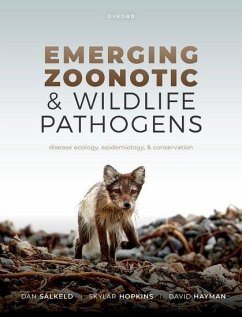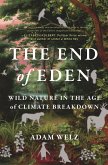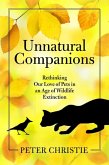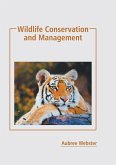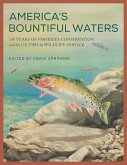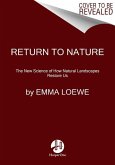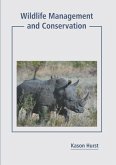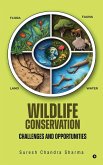Dan Salkeld, Skylar Hopkins, David Hayman
Emerging Zoonotic and Wildlife Pathogens
Disease Ecology, Epidemiology, and Conservation
Dan Salkeld, Skylar Hopkins, David Hayman
Emerging Zoonotic and Wildlife Pathogens
Disease Ecology, Epidemiology, and Conservation
- Gebundenes Buch
- Merkliste
- Auf die Merkliste
- Bewerten Bewerten
- Teilen
- Produkt teilen
- Produkterinnerung
- Produkterinnerung
The first textbook to describe the ecology and epidemiology of wildlife and zoonotic (animal-to-human) infectious diseases and the applications to conservation biology and public health. Examples of disease agents enliven the text and illustrate many of the theories presented.
Andere Kunden interessierten sich auch für
![The End of Eden The End of Eden]() Adam WelzThe End of Eden26,99 €
Adam WelzThe End of Eden26,99 €![Unnatural Companions: Rethinking Our Love of Pets in an Age of Wildlife Extinction Unnatural Companions: Rethinking Our Love of Pets in an Age of Wildlife Extinction]() Peter ChristieUnnatural Companions: Rethinking Our Love of Pets in an Age of Wildlife Extinction38,99 €
Peter ChristieUnnatural Companions: Rethinking Our Love of Pets in an Age of Wildlife Extinction38,99 €![Wildlife Conservation and Management Wildlife Conservation and Management]() Wildlife Conservation and Management161,99 €
Wildlife Conservation and Management161,99 €![America's Bountiful Waters: 150 Years of Fisheries Conservation and the U.S. Fish & Wildlife Service America's Bountiful Waters: 150 Years of Fisheries Conservation and the U.S. Fish & Wildlife Service]() America's Bountiful Waters: 150 Years of Fisheries Conservation and the U.S. Fish & Wildlife Service44,99 €
America's Bountiful Waters: 150 Years of Fisheries Conservation and the U.S. Fish & Wildlife Service44,99 €![Return to Nature Return to Nature]() Emma LoeweReturn to Nature22,99 €
Emma LoeweReturn to Nature22,99 €![Wildlife Management and Conservation Wildlife Management and Conservation]() Wildlife Management and Conservation159,99 €
Wildlife Management and Conservation159,99 €![Wildlife Conservation Wildlife Conservation]() Suresh Chandra SharmaWildlife Conservation50,99 €
Suresh Chandra SharmaWildlife Conservation50,99 €-
-
-
The first textbook to describe the ecology and epidemiology of wildlife and zoonotic (animal-to-human) infectious diseases and the applications to conservation biology and public health. Examples of disease agents enliven the text and illustrate many of the theories presented.
Hinweis: Dieser Artikel kann nur an eine deutsche Lieferadresse ausgeliefert werden.
Hinweis: Dieser Artikel kann nur an eine deutsche Lieferadresse ausgeliefert werden.
Produktdetails
- Produktdetails
- Verlag: Oxford University Press
- Seitenzahl: 368
- Erscheinungstermin: 21. März 2024
- Englisch
- Abmessung: 251mm x 191mm x 22mm
- Gewicht: 958g
- ISBN-13: 9780198825920
- ISBN-10: 0198825927
- Artikelnr.: 69192111
- Herstellerkennzeichnung
- Libri GmbH
- Europaallee 1
- 36244 Bad Hersfeld
- gpsr@libri.de
- Verlag: Oxford University Press
- Seitenzahl: 368
- Erscheinungstermin: 21. März 2024
- Englisch
- Abmessung: 251mm x 191mm x 22mm
- Gewicht: 958g
- ISBN-13: 9780198825920
- ISBN-10: 0198825927
- Artikelnr.: 69192111
- Herstellerkennzeichnung
- Libri GmbH
- Europaallee 1
- 36244 Bad Hersfeld
- gpsr@libri.de
Dan Salkeld is an ecologist & epidemiologist at Colorado State University, USA, whose vagabond field research has included a suspected case of bubonic plague in Colorado, USA, a probable case of Bolivian histoplasmosis, and confirmed tick-bites in other exotic places (both geographically and physically, but mostly in California, USA). Salkeld has taught university classes on 'Ecology of Infectious Disease' and 'One Health' which have occasionally received lukewarm praise. His current research focuses on conservation and emerging infectious diseases. Skylar Hopkins is an Assistant Professor at N.C. State University, where she researches how global change affects parasites, people, and wildlife. She has a Ph.D. in Biological Sciences from Virginia Tech, where she specialized in getting stung by bees and examining snail gonads for parasites. Though much of her research involves mathematical and statistical models, she can also be found rappelling into caves to survey white-nose syndrome in bats or wrangling wild snakes to pick trematodes out of their mouths. She has only had one zoonotic disease (Lyme disease), and that was more than enough. David Hayman is a Professor at Massey University, New Zealand. Dave's research focuses on the intersection of disease ecology, conservation, and public health. He has studied emerging and neglected diseases and has had unpleasant personal experience with salmonellosis, myiasis, scabies, and malaria, among the many undiagnosed febrile, pruritic and gastrointestinal illnesses while working throughout the world. To the surprise of many he has three degrees from UK universities: Edinburgh, Kent, and Cambridge.
1: Spillover and emerging infectious diseases
2: The anatomy of disease
3: Descriptive epidemiology of disease outbreaks
4: Surveillance
5: Making simple predictions using models
6: The environment as a pathogen reservoir
7: Reservoir hosts
8: Identifying animal reservoirs during an epidemic
9: Emerging infectious diseases and globalization-travel, trade, and invasive species
10: Climate change and emerging infectious diseases
11: Land use change and emerging infectious diseases
12: Impacts of emerging infectious diseases on wildlife populations
13: Infectious diseases in ecosystems
14: Infectious disease control
15: COVID-19, One Health, and pandemic prevention
2: The anatomy of disease
3: Descriptive epidemiology of disease outbreaks
4: Surveillance
5: Making simple predictions using models
6: The environment as a pathogen reservoir
7: Reservoir hosts
8: Identifying animal reservoirs during an epidemic
9: Emerging infectious diseases and globalization-travel, trade, and invasive species
10: Climate change and emerging infectious diseases
11: Land use change and emerging infectious diseases
12: Impacts of emerging infectious diseases on wildlife populations
13: Infectious diseases in ecosystems
14: Infectious disease control
15: COVID-19, One Health, and pandemic prevention
1: Spillover and emerging infectious diseases
2: The anatomy of disease
3: Descriptive epidemiology of disease outbreaks
4: Surveillance
5: Making simple predictions using models
6: The environment as a pathogen reservoir
7: Reservoir hosts
8: Identifying animal reservoirs during an epidemic
9: Emerging infectious diseases and globalization-travel, trade, and invasive species
10: Climate change and emerging infectious diseases
11: Land use change and emerging infectious diseases
12: Impacts of emerging infectious diseases on wildlife populations
13: Infectious diseases in ecosystems
14: Infectious disease control
15: COVID-19, One Health, and pandemic prevention
2: The anatomy of disease
3: Descriptive epidemiology of disease outbreaks
4: Surveillance
5: Making simple predictions using models
6: The environment as a pathogen reservoir
7: Reservoir hosts
8: Identifying animal reservoirs during an epidemic
9: Emerging infectious diseases and globalization-travel, trade, and invasive species
10: Climate change and emerging infectious diseases
11: Land use change and emerging infectious diseases
12: Impacts of emerging infectious diseases on wildlife populations
13: Infectious diseases in ecosystems
14: Infectious disease control
15: COVID-19, One Health, and pandemic prevention

